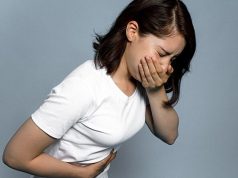It is the disturbing health trend that is baffling doctors around the globe: the well-documented rise in young people developing breast, bowel and lung cancers.
With bowel cancers at least, there appears to be one convincing theory as to why the disease has risen by 50 per cent in 20, 30 and 40-somethings over the past 30 years.
Some experts believe the explanation must lie with our increasing tastes for junk food — and the co-current rise in obesity, affecting the health of our digestive system.
However, this doesn’t explain the rise in the disease in young people who are otherwise perfectly fit and healthy.
It is a phenomenon recently highlighted by former BBC Radio 4 producer Molly Guinness, who had been diagnosed with bowel cancer aged 39, in a series of posts on X.

Molly Guinness is just the latest in a series of young people to document their shock over being diagnosed with disease most people associate with the elderly.

Zu Rafalat, 38, of Finsbury Park, whose bloating left her looking 'six months pregnant’, was horrified to be diagnosed with stage four bowel cancer. She is pictured on holiday
In one viewed nearly 15,000 times she said: 'I’m one of five young people I know diagnosed with colon cancer in the last year – all of us are slim with healthy diets.’
’I look around the waiting room at the colorectal clinic – everyone I see there has a healthy BMI.’
She isn’t alone. Official data show colon cancer rates have increased 52 per cent among 25-to-49 year-olds since the early 90s.
In contrast rates of the disease in older groups, who are statistically more likely to get the disease overall, have either declined or remained stable to the same period.
However, the vast majority of bowel cancers still affect those aged over 50.
Several recent studies have linked the consumption of junk or ultra-processed foods (UPFs) to an increased risk of colon cancer.
A recent Singaporean study found methylglyoxal, a compound released when the body breaks down sugary and fatty foods, has an effect on a gene that helps fight off tumors.
It follows a 2023 study in the journal Clinical Nutrition that found a 'consistent significant association between intake of UPF and the risk of overall and several cancers,’ including colon.
However, not all experts believe junk food and UPFs are solely to blame for the trend, and the type of patients affected would suggest they’re right to have these doubts.
Experts have told MailOnline the junk food analysis is far too simple an explanation for what is being seen in clinics.
Oncologists note that while junk food consumption is heavily linked with obesity, itself a risk factor for several cancers, young people both fat and thin are being diagnosed with colon cancer at roughly the same rate.

Ms Rafalat, pictured riding a horse before her diagnosis, said: 'I’ve been fit and healthy for my entire life. I never dreamed I could get bowel cancer at my age’
So, what is causing this explosion of colon cancer, sometimes also called bowel cancer, in young people?
Professor Karol Sikora, a world-renowned oncologist with over 40 years’ experience, told this website it is likely to be due to 'changing lifestyles’ over the last 50 years. However exactly which change has increased cancer risk is a mystery.
‘It doesn’t seem to be particularly associated with obesity,’ he said.
‘There’s no difference in vegetarians’ increasing early-onset cancer rate either, which is part of the puzzle.’
Professor Sikora, while acknowledging junk food and UPFs could be factors, added that blaming these alone was overly 'simplistic’.

When Ellie Wilcock experienced a sudden pain in her abdomen, she assumed that a urinary tract infection was to blame. Pictured here in 2021

The content manager’s illness began with an 'extreme pain’ in her abdomen. Ellie, 27 and from Peterborough, was diagnosed with stage four bowel cancer – the most serious kind of the disease
He said that his suspicion was that a change in young people gut’s microbiome — the thousands of bugs in our digestive system — could be responsible for increasing cancer risk.
‘A healthy microbiome is critical for preventing bowel cancer,’ he said. 'Gut cells bathe in the products produced by the bacteria 24/7.
‘So it wouldn’t be surprising if some changes resulted in a higher or lower incidence of colon cancer.’
Some of the organisms in our gut are helpful aiding digestion or, by their very presence, stopping other, harmful, organisms from taking root.
But the microbiome, and the links between those organisms and the influencer of their by-products, is complicated.
‘The trouble when analysing that is that it is so complex, there are so many factors that affect the microbiome; diet, alcohol, how you cook food,’ Professor Sikora said.

Evan White, from Dallas and the eldest of three children, was diagnosed with stage three colon cancer at the age of 24 after going into hospital to get an abscess removed from his tonsils

Evan pictured above at Christmas with his then puppy, a Bernese Mountain Dog, named Lola
MailOnline has repeatedly documented the global rise of colon cancer among young people.
Perhaps the most recognisable victim of the trend is Deborah James — known as 'bowel babe’ — who was diagnosed at just 35 and raised millions for charity in her final days in 2022.
James spoke of her rigorous exercise routine, and being in the best shape of her life when she developed the illness.
Another example of seemingly fit and health women being hit by the disease was Zu Rafalat, of Finsbury Park, London, who died in 2020 aged 39.
The super-fit globetrotter initially thought she had caught a stomach bug in Central America where she went on holiday in December 2018.
But two weeks later, her stomach had become so swollen she was wearing maternity jeans, and even her GP asked if she was pregnant before prescribing IBS pills.
After getting the opinion of a second, private doctor, Ms Rafalat was given CT scans which spotted a mass on her right ovary.
It later turned out to be stage four bowel cancer which had spread to other organs.

Melissa Dunmore, from Melbourne, was handed the news on February 8 after surgeons found a 20cm tumour in her colon along with 11 tiny pre-cancerous polyps
Ms Rafalat, who was managing director of a consultancy agency, said at the time: 'I’ve been fit and healthy for my entire life. I never dreamed I could get bowel cancer at my age.’
Another, young British women hit by the disease in her prime was Ellie Wilcock who after experiencing a sudden pain in her abdomen, assumed that a urinary tract infection was to blame.
Ellie, now 27, from Peterborough, who enjoyed playing sports like tennis and hiking before her diagnosis, was eventually diagnosed with stage four bowel cancer – the most serious kind of the disease.
And it isn’t just British women.
Melissa Dunmore, a 'fit and healthy’ 33-year-old mother from Melbourne, was given the news she had bowel cancer earlier this year after surgeons found a 20cm tumour in her colon along with 11 tiny pre-cancerous polyps.
She had no family history of the disease, and her only symptoms were slightly low iron and a small amount of blood in her stools.
Meanwhile, Evan White, 24, from Dallas, had just graduated from the University of Arkansas with a degree in finance when he was diagnosed with colon cancer after dismissing his main symptom – tiredness – for months.
The tumour was not spotted until it had progressed to stage three, meaning it had spread outside the colon, making it much harder to treat.
Consultant oncologist Dr Hendrik-Tobias Arkenau, from HCA Healthcare in London, said the rise in colon cancers among young people was a 'real concern’.
He added that such cancers are most frequently only being spotted in their later, or sometimes tragically, final stages.
‘Who thinks a 35 or 42-year-old has bowel cancer if they have tummy ache, weight loss, some blood (in stool),’ he said.
Dr Arkenau said while the reason behind the increase remained unclear, he too thought it was a combination of factors influencing the microbiome of young people’s guts.
He said use of antibiotics in childhood, falling rates of breastfeeding, vitamin intake and diet changes are just some factors that could be at play.
‘There is no clear cut one thing, I think it is multi-factorial and there are other aspects like dropping vitamin D levels,’ he said.
Dr Arkenau added that, for this reason, it isn’t as simple as saying a ban junk food or UPFs and will solve the problem.

Dame Deborah James, nicknamed 'bowel babe’, raised more than £11.3million for Cancer Research and is credited with increasing awareness of the disease, which killed her in 2022 aged 40
Dr Arkenau said one change that could be made now is to treat any possible symptoms of this cancer in this group seriously.
‘If someone comes and says “I’ve lost weight, had a bit of blood, a bit of a tummy ache”, it’s not always irritable bowel syndrome, it’s not always appropriate to say “come back in three months and be checked”.’
He said primary care teams need to be ‘more aware of the rise’ and take younger patients with potential symptoms more seriously.
‘Instead of a stool sample test and that taking a few weeks, get them in for a colonoscopy.’
Analysis suggests deaths from bowel cancer overall in the UK are set to rise by 2,500 a year between now and 2040.
Meanwhile, the number of people in the UK diagnosed with the disease will rise by around a tenth in the same period.
Bowel cancer currently kills just shy of 17,000 Brits each year with only half of those diagnosed expected to survive 10 years after learning they have the disease.



